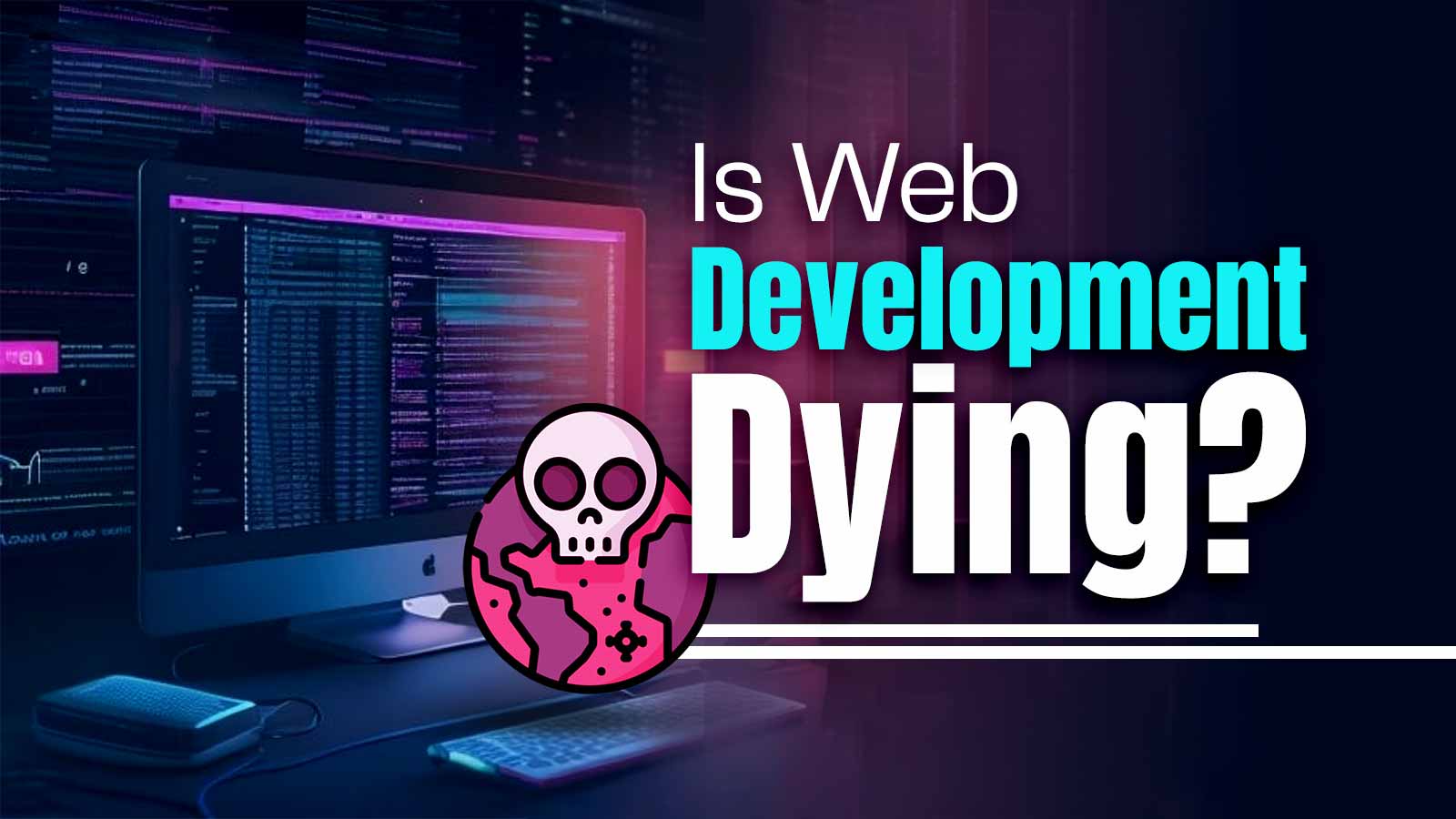
Is Web Development Dying? Past, Present & Future Of Web Development
As technology changes quickly, it’s natural to wonder how long some fields will last and how important they will remain. One such query is web development dying in 2023.
No, web development is not dying. It remains a dynamic and integral part of the digital landscape, constantly evolving to meet new challenges and opportunities. With the ever-growing reliance on online platforms, web development continues to thrive, offering exciting prospects for developers in the present and the future.
This blog post delves into the myths surrounding the demise of web development, exploring the reasons it remains a vibrant and essential domain.
Is Web Development Dying?

Web development is far from dying; it remains a cornerstone in the digital landscape. Websites, apps, and online experiences continue to rely on skilled developers. Since its inception in 1993, web design and development have evolved significantly, moving beyond simple brochures to complex, interactive platforms.
While some speculate about the future, coding remains an essential skill in the web development industry. The demand for adept web developers persists as businesses seek professionals who can navigate the ever-evolving IT sector. Premade templates may offer convenience, but custom website creation requires the expertise of developers to ensure user-friendly, innovative solutions. In essence, web development is still ongoing but adapting to the dynamic technological landscape, securing its relevance in the digital era.
Why Web Development Is Not Dying?

Web development is far from dying, and several reasons underscore its enduring significance and vitality.
Continuous Maintenance and Updates:
Creating a website is a one-time effort, but maintaining it requires ongoing upkeep. The dynamic nature of the Internet demands constant updates, security enhancements, and content modifications, ensuring a perpetual need for web development skills.
Collaborative Nature of the Profession:
While developers may spend solitary hours writing code, collaboration is fundamental. Working with clients, project managers, and designers is integral to crafting functional and aesthetically pleasing websites, highlighting the social and teamwork aspects of web development.
Emphasis on Usability and Practicality:
Aesthetics are important, but web developers prioritize practicality and usability. Striving for websites that not only look good but also function seamlessly is a key aspect of the profession.
Diverse Skill Set Requirements:
Web development extends beyond coding, requiring proficiency in user research, design theory, database organization, and cutting-edge software. The combination of design and coding skills is essential for creating well-rounded and effective websites.
Skill Differentiation in a Crowded Learning Space:
While many can learn the basics of web development, true proficiency demands practice, knowledge, and skill. Experienced developers play a crucial role in crafting high-quality websites with smooth functionality and captivating design, differentiating their expertise in a crowded learning space.
Versatility Beyond Front-End and Back-End Programming:
Web development encompasses various disciplines, including front-end and back-end programming, database administration, server setup, and security. The versatility of skills required makes web development a multifaceted and enduring field.
Accessibility for Small Businesses and Individuals:
Contrary to the notion that only major corporations can afford web development, services are available for a wide range of projects. A strong internet presence is beneficial for small businesses and individuals, making web design and development services accessible and indispensable.
Starting Journey Of Web Development
The journey of web development spans over fifty years, evolving from the conceptualization of the Internet to its widespread adoption as a household utility in the 1990s. The World Wide Web, conceptualized in the 1980s, gained momentum with the release of the Mosaic browser in 1993, marking a pivotal moment in internet history. Corporations recognized the economic potential of the web, leading to a surge in online activities supported by evolving network infrastructure.
In 1989, Tim Berners-Lee proposed a computer platform at the CERN Laboratory, giving rise to the development of Hypertext Markup Language (HTML) in 1990. HTML, rooted in SGML, became a foundational element of the World Wide Web, facilitating flexible web page layouts and interaction across networks.
While the first wide area network (WAN) emerged in 1965, and local area networks (LAN) were established in 1983, the Internet’s contemporary form crystallized when these technologies merged with Berners-Lee’s vision. By the mid-1990s, widespread interest led to the launch of the first commercial websites, paving the way for the dynamic and ever-evolving field of web development.
The New Millennium
In the new millennium, following the dot-com bust of 2000–2001, the Internet experienced rapid growth. Despite increased government control, powerful IT firms emerged, shaping a new trajectory for online business and culture. Improved infrastructure led to the Internet becoming the primary mode of contemporary communication, surpassing other methods.
With faster connections and increased storage space, web designers gained unprecedented tools, utilizing Cascading Style Sheets for innovative presentation. Video streaming transformed the consumption of motion pictures, while Flash video birthed a new realm of online art and animation. Despite these advancements, the fundamental structure of web pages has largely endured, showcasing the resilience and adaptability of web development.
The Present Of Web Development
The presence of web development reflects a transformative era where the Internet is a pivotal force in the global superconductive network. Modern applications seamlessly integrate web technologies in both front-end and back-end systems. Frameworks like React, Vue, Angular, and NodeJS have evolved significantly, addressing the challenges of the web.
Innovations like Server Side Rendering (SSR) and Static Generation (SSG) have given rise to rapid, production-ready frameworks like NextJS. This technological evolution has spawned a new ecosystem, making it easier to develop sophisticated full-stack online apps and find elegant solutions to complex challenges. The web development industry is now established, fiercely competitive, and poised for continuous growth and innovation.
Is There Any Future Of Web Development?

The future of web development is poised for groundbreaking advancements driven by emerging technologies and evolving trends. GitHub Copilot, an AI-powered coding assistant, revolutionizes the coding experience, enhancing efficiency and innovation.
Accelerated Mobile Pages (AMP) ensure faster loading times for mobile users, optimizing the web experience. Artificial Intelligence (AI) integration continues to shape intelligent, personalized interactions, while blockchain technology and decentralized approaches promise enhanced security and transparency.
The move towards serverless architecture, Progressive Web Apps (PWAs), and Motion UI signifies a shift toward seamless, dynamic, and engaging web experiences. Quantum computing introduces unprecedented computational power, transforming data processing capabilities. Response Animation Idle Load (RAIL) and Single Page Applications (SPAs) redefine user experiences, focusing on responsiveness and efficiency.
As the web development industry embraces these technologies, the future holds a landscape of innovation, efficiency, and user-centric design. Web developers are at the forefront of shaping a digital future that is dynamic, secure, and technologically advanced, ensuring continuous growth and evolution in the field.
Skill Sets Needed for Web Development

Web development is a dynamic field, constantly evolving with new tools and technologies. To thrive in this industry, developers need a versatile skill set that encompasses various aspects of the web development landscape.
Developing Mobile Apps
As the use of mobile devices for web access continues to rise, mobile app development skills are crucial. Platforms like React Native allow developers to create cross-platform apps for both Android and iOS. Additionally, familiarity with Progressive Web Apps (PWAs) positions developers as valuable assets, ensuring versatility in catering to diverse user preferences.
Back-End Development
Back-end developers play a pivotal role in ensuring the functionality of websites and applications. Proficiency in languages such as PHP, Python, Ruby, and Java is essential. Knowledge of content management systems (CMS) like WordPress or Drupal, as well as e-commerce platforms like WooCommerce or Magento, enhances job prospects. Back-end developers also need expertise in file handling and implementing robust web security measures for user protection.
Front-End Development
Front-end developers focus on creating engaging user interfaces and experiences. Mastery of fundamental languages such as HTML, CSS, and JavaScript is foundational and enduring. Frameworks like Bootstrap, Foundation, and Materialize facilitate the rapid development of responsive sites compatible with various devices. Adopting tools like React, Vue.js, and Angular allows developers to craft dynamic and interactive user experiences.
Continuous Learning
Given the ever-evolving nature of web development, a commitment to continuous learning is essential. Staying updated on emerging technologies, frameworks, and design trends ensures developers remain competitive in the job market. The ability to adapt to new tools and methodologies is a hallmark of successful web developers.
Problem-Solving Skills
Web development often involves overcoming complex challenges and debugging issues. Strong problem-solving skills enable developers to identify and resolve issues efficiently, contributing to the seamless functioning of websites and applications.
Collaboration and Communication
Effective collaboration and communication skills are vital in a web development team. Developers must be able to convey ideas clearly, work cohesively with designers and other team members, and understand client requirements to deliver successful projects.
Version Control Systems
Proficiency in version control systems, such as Git, is essential for managing code repositories and collaborating with other developers. Version control ensures code integrity, facilitates collaboration, and allows for efficient tracking of changes over time.
Responsive Design Principles
Understanding and implementing responsive design principles is crucial for creating websites and applications that adapt seamlessly to various screen sizes. This includes optimizing layouts, images, and interactive elements for a cohesive user experience across devices.
Advantages and Disadvantages of No-Code Development
Advantages:
- Ease of Use and Minimal Training:
- No-code systems are designed to be user-friendly, allowing individuals without coding expertise to build applications effortlessly. The intuitive, drag-and-drop interface simplifies the app development process, requiring minimal training.
- Cost Savings:
- Implementing no-code solutions can lead to cost savings for businesses. Non-programmers can add simple features without the need for extensive IT involvement. This allows IT professionals to focus on more complex tasks and high-impact projects, resulting in efficient resource utilization.
- Mitigating Shadow IT Risks:
- No-code platforms provide a controlled environment where users in the Line of Business (LOB) can choose from pre-approved options. This reduces the likelihood of users installing unauthorized third-party software, minimizing security risks associated with shadow IT practices.
Disadvantages:
- Integration Challenges:
- No-code development may face challenges when integrating with other software systems. Depending on the platform’s position on the low-code/no-code spectrum, importing data from external programs might be challenging. Some supposedly code-free applications come with integration tools, but they may still require basic programming knowledge.
- Limitations in Handling Complex Tasks:
- The simplicity and accessibility of no-code development come at a cost – the inability to handle complex tasks. While suitable for straightforward applications, no-code solutions may lack the flexibility and functionality required for more intricate business applications. Some platforms offer “escape hatches” or features that allow technically skilled users to incorporate coding for greater flexibility.
- Dependency on Advanced Features:
- No-code platforms often provide advanced features or “escape hatches” for users with coding expertise. In scenarios where more complex functionalities are needed, users may find themselves relying on these advanced features, blurring the line between no-code and low-code development. This dependency on coding skills can diminish the purported simplicity of no-code platforms.
Can You Still Find Work as a Web Developer?

In the rapidly evolving landscape of technology, the demand for skilled web developers remains consistently high. Despite the prevalence of low-code platforms and website builders, the need for proficient web developers continues to grow. Here are seven compelling reasons why individuals can still find ample opportunities as web developers:
Ever-Increasing Digital Presence
As businesses and individuals alike seek to establish and enhance their digital presence, the demand for web developers remains robust. A compelling and functional website is a fundamental component of modern business strategies, driving the need for skilled developers who can create user-friendly and visually appealing online experiences.
E-Commerce Expansion
The proliferation of online shopping and e-commerce platforms has led to an increased demand for web developers. Businesses are continually investing in e-commerce websites to reach a global audience, creating opportunities for developers with expertise in building secure and scalable online storefronts.
Mobile App Development
The surge in mobile device usage has fueled the demand for mobile app development. Web developers with skills in frameworks like React Native or Flutter can seamlessly transition into mobile app development, further expanding their job prospects. The versatility to create cross-platform applications is a valuable asset in the current market.
Technological Advancements
Web development is a dynamic field that constantly embraces new technologies and frameworks. Developers who stay updated on the latest advancements, such as Progressive Web Apps (PWAs), single-page applications (SPAs), and serverless architecture, remain highly sought after. The ability to adapt to emerging trends ensures ongoing relevance in the industry.
Diversity of Industries
Web development is not confined to a specific industry but is integral to various sectors, including finance, healthcare, education, entertainment, and more. This diversity of industries ensures that web developers can find opportunities across different domains, allowing them to explore areas aligned with their interests and expertise.
Remote Work Opportunities
The rise of remote work has significantly broadened the geographical scope of job opportunities. Web developers can collaborate with teams and clients worldwide, offering flexibility and autonomy in their work arrangements. This shift has opened doors for individuals to choose roles that align with their skills and preferences, irrespective of their physical location.
Custom Solutions Over Templates
While website templates and content management systems (CMS) are prevalent, businesses often require custom solutions to meet their specific needs. Web developers who can create tailored and unique websites addressing the distinct requirements of clients are highly valued. Custom development allows for greater flexibility and innovation, driving the preference for skilled developers over template-based solutions.
Is Web Development A Good Career To Choose?

Absolutely, web development is a lucrative and fulfilling career choice. In the United States, web developers can enjoy an average annual salary of $81,957, combining a base income of $77,367 with an average of $4,589 in bonuses per year, according to Glassdoor. Additional compensatory factors such as commissions, bonuses, and profit-sharing can further contribute to the overall compensation package.
The salary ranges are influenced by various factors, including the individual’s education, experience, and the prevailing market demand for web development skills. With a continually growing demand for digital solutions and online experiences, pursuing a career in web development provides not only financial rewards but also the opportunity to contribute to the dynamic and ever-expanding digital landscape.
How To Adapt Yourself As A Future Web Developer?

Adapting to the evolving landscape of web development is crucial for staying relevant and thriving in the industry. Here are five suggestions on how to adapt as a future web developer:
Embrace Continuous Learning
The tech industry is dynamic, with new languages, frameworks, and tools emerging regularly. Dedicate time to continuous learning by exploring new technologies and staying updated on industry trends. Online platforms, coding boot camps, and community forums can provide valuable resources for expanding your skill set.
Master Full-Stack Development
While specializing in either front-end or back-end development is common, becoming proficient in both—known as full-stack development—enhances your versatility. Employers often seek developers who can handle various aspects of a project, making full-stack developers valuable assets.
Adopt Responsive Design Practices
With the increasing use of mobile devices, responsive design is critical. Ensure your websites and applications adapt seamlessly to different screen sizes. Familiarize yourself with responsive design principles, CSS frameworks like Bootstrap, and techniques for creating user-friendly experiences across devices.
Explore No-Code/Low-Code Tools
No-code/low-code platforms are gaining popularity for their ease of use in creating applications without extensive coding. While not a replacement for traditional development, understanding these tools can broaden your skill set and offer efficient solutions for specific tasks.
Cultivate Soft Skills
Technical skills are essential, but soft skills play a significant role in your success. Develop effective communication, problem-solving, and teamwork skills. As a web developer, you’ll collaborate with various stakeholders, and strong interpersonal skills will contribute to successful project outcomes.
FAQs
Is Web Development Still In Demand?
Absolutely! The demand for web development is consistently high. As businesses and individuals seek to establish and enhance their online presence, skilled web developers are in constant demand to create and maintain functional and visually appealing websites.
What Skills Are Essential For A Web Developer In Today’s Landscape?
Key skills include proficiency in programming languages like HTML, CSS, and JavaScript, knowledge of responsive design, understanding of web frameworks, and familiarity with tools like Git. Soft skills like problem-solving and effective communication are also crucial.
Are No-Code/Low-Code Platforms A Threat To Web Development Jobs?
While no-code/low-code platforms provide accessibility for simpler tasks, they can’t replace the complexity handled by skilled web developers. These platforms may complement certain aspects but won’t eliminate the need for professionals in web development.
How Has Ai Impacted Web Development?
AI is enhancing productivity by automating repetitive tasks in web development, such as testing and bug fixing. However, it is not expected to replace human creativity and problem-solving abilities in the field.
Is Web Development Limited To Building Websites?
No, web development extends beyond websites. It encompasses various applications, including mobile apps, content management systems, and other software solutions. Learning web development opens doors to a broader range of software development opportunities.
Can Individuals With No Coding Experience Enter Web Development?
Yes, individuals with no coding experience can enter web development. There are numerous resources and coding boot camps designed for beginners. However, becoming proficient requires dedication, practice, and a commitment to continuous learning.
What Role Does Teamwork Play In Web Development?
While developers may spend time working independently, collaboration is integral to web development. Cooperation with clients, designers, and project managers ensures that websites meet both aesthetic and functional requirements, emphasizing the importance of teamwork in the field.
Finally, Is There a Fortune for Web Developers in AI?
Certainly, there is a promising future for web developers in the realm of AI. While there’s no imminent expectation of AI replacing web developers, it is essential to recognize that AI is still in its early stages and cannot supplant human creativity and analytical skills. Human ingenuity remains unparalleled, especially in fields requiring architectural design and complex problem-solving.
AI, however, is already enhancing efficiency in web development procedures. By handling mundane and repetitive tasks, AI allows developers to allocate more time to strategic problem-solving and innovative endeavors. As AI continues to evolve, developers can anticipate more intriguing career opportunities through their collaboration with AI, ensuring that their skills remain relevant and valuable in an increasingly technologically advanced landscape. Hence, there’s no need for concern about AI jeopardizing the future of web developers; rather, it presents opportunities for collaboration and enhancement.

















































